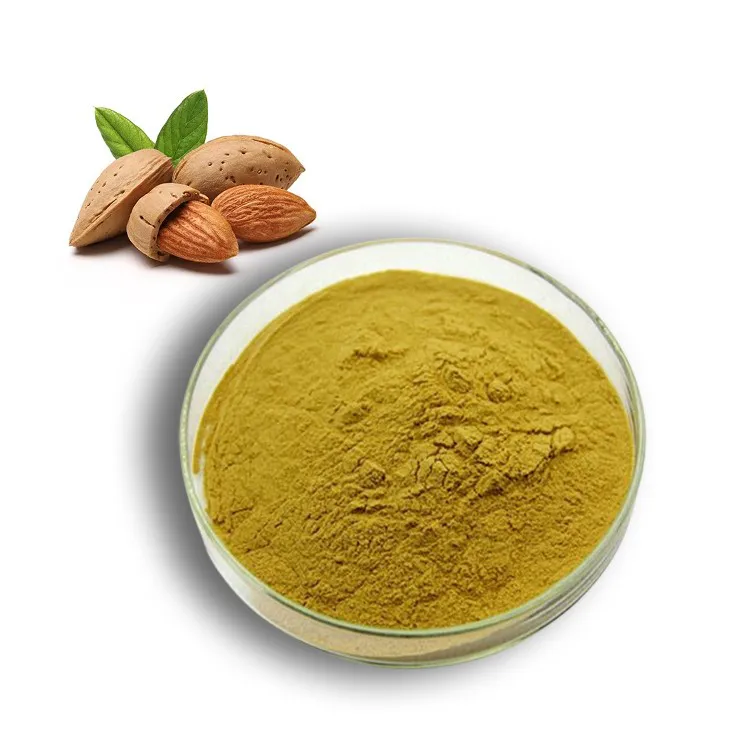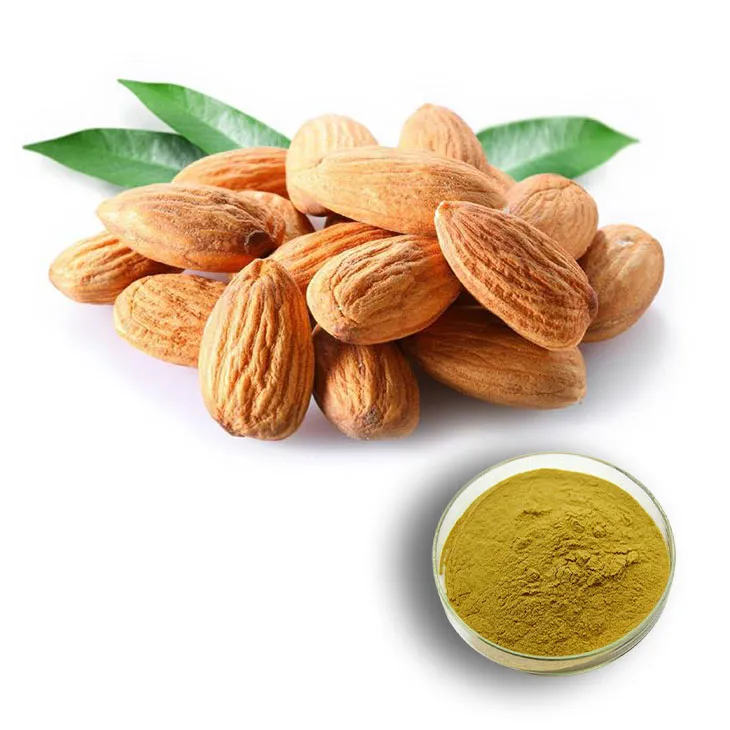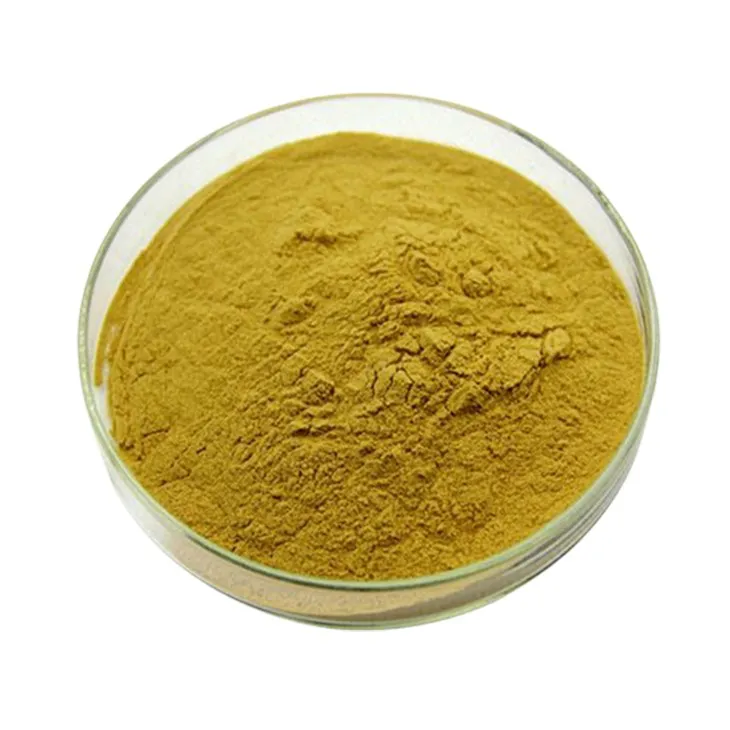- 0086-571-85302990
- sales@greenskybio.com
Almond extract powder: components of fertilizer and feed.
2024-11-29

1. Introduction
Almond Extract Powder is emerging as a potentially valuable substance in the fields of fertilizer and feed. With the increasing demand for sustainable and effective agricultural and livestock production methods, exploring the components of Almond Extract Powder for these applications becomes crucial. This powder is derived from almonds, a well - known and widely used nut with various beneficial properties. Understanding its components can unlock new possibilities for enhancing plant growth in fertilizers and improving animal health in feeds.

2. Components in Almond Extract Powder for Fertilizer Use
2.1 Macronutrients
Nitrogen: Although almond extract powder may not be a highly concentrated source of nitrogen like some traditional fertilizers, it does contain a certain amount of this essential macronutrient. Nitrogen is vital for plant growth as it is a major component of chlorophyll, the molecule responsible for photosynthesis. In almond extract powder, the nitrogen may be present in various organic forms that can be slowly released into the soil, providing a continuous supply to plants over time.
Phosphorus: Phosphorus is another crucial macronutrient found in almond extract powder. It plays a fundamental role in energy transfer within plants, being a key part of ATP (adenosine triphosphate). Adequate phosphorus levels are necessary for root development, flowering, and fruiting. The phosphorus in almond extract powder can contribute to better overall plant structure and productivity.
Potassium: Potassium is important for plant water regulation and enzyme activation. Almond extract powder contains potassium in amounts that can help plants withstand environmental stresses such as drought and disease. It also enhances the quality of fruits and vegetables by improving their taste and texture.
2.2 Micronutrients
Iron: Iron is a micronutrient that is essential for plant respiration and chlorophyll synthesis. In almond extract powder, iron may be present in forms that are more easily absorbed by plants compared to some inorganic iron sources. Iron deficiency can lead to yellowing of leaves (chlorosis), and the iron in almond extract powder can help prevent this condition.
Zinc: Zinc is involved in various enzymatic reactions in plants. It affects plant growth hormones and is necessary for proper leaf development and seed formation. Almond extract powder can supply zinc to plants, especially in soils where zinc availability may be limited.
Manganese: Manganese is required for photosynthesis and nitrogen metabolism in plants. The presence of manganese in almond extract powder can support healthy plant growth and development, especially in regions where manganese - deficient soils are common.
2.3 Organic Compounds
Amino Acids: Almond extract powder contains amino acids, which are the building blocks of proteins. These amino acids can be taken up by plants and used for various metabolic processes. For example, some amino acids can enhance the plant's resistance to pests and diseases, while others are involved in the synthesis of plant hormones.
Carbohydrates: Carbohydrates in almond extract powder can serve as an energy source for soil microorganisms. These microorganisms play a crucial role in soil fertility by decomposing organic matter and releasing nutrients in a form that plants can use. Additionally, some carbohydrates may also have a direct effect on plant growth, perhaps by influencing root exudates or plant - microbe interactions.
Phenolic Compounds: Phenolic compounds in almond extract powder have antioxidant properties. In the soil, they can help protect plants from oxidative stress caused by environmental factors such as pollution and UV radiation. They may also have allelopathic effects, which can either inhibit or stimulate the growth of neighboring plants depending on the specific compound and concentration.

3. Components in Almond Extract Powder for Feed Use
3.1 Proteins and Amino Acids
High - Quality Proteins: Almond extract powder contains proteins that are of high quality, meaning they have a balanced composition of essential amino acids. These proteins are important for animal growth, development, and maintenance of body tissues. For example, in livestock such as cattle, pigs, and poultry, the proteins in almond extract powder can contribute to muscle development and overall body condition.
Essential Amino Acids: The presence of essential amino acids in almond extract powder is particularly significant. Animals cannot synthesize these amino acids on their own and must obtain them from their diet. Amino acids such as lysine, methionine, and tryptophan are crucial for proper growth, reproduction, and immune function in animals.
3.2 Fatty Acids
Unsaturated Fatty Acids: Almond extract powder contains unsaturated fatty acids, which are beneficial for animal health. These fatty acids can improve the quality of animal products such as meat and eggs. For example, omega - 3 fatty acids can reduce inflammation in animals and may also have a positive impact on the fatty acid profile of animal - derived products, making them more nutritious for human consumption.
Saturated Fatty Acids: While almond extract powder is not a major source of saturated fatty acids, the small amount present can still play a role in providing energy to animals. Saturated fatty acids are important for maintaining cell membrane integrity and can be stored as energy reserves in animals.
3.3 Vitamins and Minerals
Vitamins: Almond extract powder contains various vitamins, such as vitamin E. Vitamin E is an antioxidant that helps protect animal cells from damage. It also plays a role in improving the reproductive performance of animals and enhancing their immune system. Other vitamins present in almond extract powder may also contribute to overall animal health in different ways.
Minerals: Minerals like calcium, phosphorus, and potassium are also found in almond extract powder. Calcium is essential for bone development in animals, phosphorus is involved in energy metabolism, and potassium is important for proper nerve and muscle function. These minerals are necessary for maintaining normal physiological functions in animals.
3.4 Bioactive Compounds
Flavonoids: Flavonoids in almond extract powder have various biological activities. They can act as antioxidants, anti - inflammatory agents, and may also have antimicrobial properties. In animal feed, flavonoids can help improve the health of animals by reducing oxidative stress and inflammation, and protecting against microbial infections.
Phytosterols: Phytosterols are compounds that can have a positive impact on animal health. They can help reduce cholesterol levels in animals, which is beneficial for their cardiovascular health. Additionally, phytosterols may also influence the absorption of other nutrients in the digestive tract of animals.

4. Benefits of Using Almond Extract Powder in Fertilizer and Feed
4.1 In Fertilizer
Sustainable and Environmentally Friendly: Using almond extract powder as a fertilizer component can be a more sustainable option compared to some synthetic fertilizers. It is a natural product, and its use can reduce the environmental impact associated with the production and use of chemical fertilizers. For example, it can help improve soil structure and water - holding capacity over time, reducing the need for excessive irrigation.
Slow - Release of Nutrients: The nutrients in almond extract powder are often released slowly into the soil. This slow - release characteristic can provide a more continuous supply of nutrients to plants, reducing the risk of nutrient leaching and over - fertilization. It also allows plants to better absorb and utilize the nutrients, resulting in more efficient growth.
Enhanced Soil Health: Almond extract powder can improve soil health by promoting the growth of beneficial soil microorganisms. These microorganisms can break down organic matter more effectively, releasing additional nutrients and improving soil aeration. This, in turn, creates a more favorable environment for plant roots to grow.
4.2 In Feed
Improved Animal Growth and Performance: The components in almond extract powder can contribute to better animal growth, reproduction, and overall performance. The high - quality proteins, essential amino acids, and other nutrients can support muscle development, improve feed conversion efficiency, and enhance the quality of animal products.
Enhanced Animal Health: The vitamins, minerals, bioactive compounds, and fatty acids in almond extract powder can help improve the immune system of animals, protect them from diseases, and reduce inflammation. This can lead to healthier animals with lower mortality rates and reduced need for antibiotics.
Value - Added Animal Products: The use of almond extract powder in feed can result in animal products with improved nutritional value. For example, eggs and meat from animals fed with almond extract - containing feed may have higher levels of beneficial nutrients such as omega - 3 fatty acids and vitamin E, which are desirable for human consumption.

5. Considerations and Limitations
5.1 Cost
One of the main considerations when using almond extract powder in fertilizer and feed is the cost. Producing almond extract powder may be more expensive compared to some traditional fertilizer and feed ingredients. This cost may limit its widespread use, especially in large - scale agricultural and livestock operations. However, as the demand for sustainable and high - quality products increases, the cost may become more competitive over time.
5.2 Quality Control
Ensuring the quality of almond extract powder is crucial. There may be variations in the composition of the powder depending on the source of almonds and the extraction process used. Standardized quality control measures need to be in place to ensure that the powder contains consistent levels of nutrients and bioactive compounds. This is important for both fertilizer and feed applications to achieve reliable results.
5.3 Allergenic Potential
Almonds are known to be allergenic, and although the extract powder may be processed, there is still a potential for allergenic reactions in animals or humans. In feed, it is important to ensure that the use of almond extract powder does not cause any adverse reactions in the animals. In fertilizer use, there may be concerns if the powder comes into contact with humans during handling, especially those with almond allergies.
6. Conclusion
Almond extract powder has a diverse range of components that make it a promising candidate for use in both fertilizer and feed. Its macronutrients, micronutrients, organic compounds, proteins, fatty acids, vitamins, minerals, and bioactive compounds can offer numerous benefits for plant growth and animal health. However, there are also considerations such as cost, quality control, and allergenic potential that need to be addressed. With further research and development, almond extract powder could play an increasingly important role in sustainable agriculture and livestock production, providing a natural and potentially more effective alternative to some existing products.
FAQ:
What are the main components in almond extract powder that are beneficial for fertilizers?
Almond extract powder may contain various nutrients such as nitrogen - containing compounds, certain minerals like potassium and phosphorus in trace amounts. These components can play important roles in plant growth. Nitrogen is crucial for leaf development, while potassium and phosphorus contribute to root growth, flowering, and fruiting.
How can the components of almond extract powder improve animal health when used in feed?
The components in almond extract powder might include essential amino acids, vitamins, and bioactive compounds. Amino acids are the building blocks of proteins, which are essential for muscle development and overall growth in animals. Vitamins help in various metabolic processes. Bioactive compounds may have antioxidant properties, which can protect the cells of animals from damage, thereby enhancing their health.
Are there any potential harmful components in almond extract powder for use in fertilizer and feed?
While almond extract powder has potential benefits, there could be some concerns. For example, if not properly processed, it might contain trace amounts of cyanogenic glycosides, which can be toxic in large amounts. However, in normal and properly processed almond extract powder for fertilizer and feed applications, the levels are usually very low and are not likely to cause harm. But strict quality control is necessary to ensure safety.
How are the components of almond extract powder different from traditional fertilizer and feed components?
Traditional fertilizers mainly focus on providing macronutrients like nitrogen, phosphorus, and potassium in large quantities. Almond extract powder, on the other hand, may offer a more diverse range of nutrients and bioactive compounds in addition to these basic elements. In terms of feed, traditional feed components are more about meeting basic nutritional requirements such as proteins, fats, and carbohydrates. Almond extract powder can bring in unique bioactive substances that may have additional positive impacts on animal health, such as those with antioxidant or immune - enhancing properties.
How can the components of almond extract powder be optimized for better use in fertilizer and feed?
To optimize the use of almond extract powder in fertilizers, research can be done on the best extraction methods to ensure maximum nutrient availability. For feed, studies can focus on determining the appropriate dosage and combination with other feed ingredients. Additionally, understanding the interaction between the components of almond extract powder and the soil or animal digestive system is crucial. This can be achieved through further experimentation and analysis to find the most effective ways to use it for improved plant growth and animal health.
Related literature
- The Composition and Potential Applications of Almond - Derived Products in Agriculture"
- "Almond Extracts: Components and Their Significance in Animal Nutrition"
- "Utilizing Almond Extract Powder in Modern Fertilization and Feeding Practices"
- ▶ Hesperidin
- ▶ Citrus Bioflavonoids
- ▶ Plant Extract
- ▶ lycopene
- ▶ Diosmin
- ▶ Grape seed extract
- ▶ Sea buckthorn Juice Powder
- ▶ Fruit Juice Powder
- ▶ Hops Extract
- ▶ Artichoke Extract
- ▶ Mushroom extract
- ▶ Astaxanthin
- ▶ Green Tea Extract
- ▶ Curcumin
- ▶ Horse Chestnut Extract
- ▶ Other Product
- ▶ Boswellia Serrata Extract
- ▶ Resveratrol
- ▶ Marigold Extract
- ▶ Grape Leaf Extract
- ▶ New Product
- ▶ Aminolevulinic acid
- ▶ Cranberry Extract
- ▶ Red Yeast Rice
- ▶ Red Wine Extract
-
Centella Asiatica Extract
2024-11-29
-
Polygonum multiflorum extract
2024-11-29
-
American Ginseng Root Extract
2024-11-29
-
Calendula Extract
2024-11-29
-
Oyster Mushroom Extract Powder
2024-11-29
-
Beta Carotene
2024-11-29
-
Saw Palmetto Extract
2024-11-29
-
Jujube Extract
2024-11-29
-
Bamboo Leaf extract
2024-11-29
-
Panax Ginseng Leaf Extract
2024-11-29





















